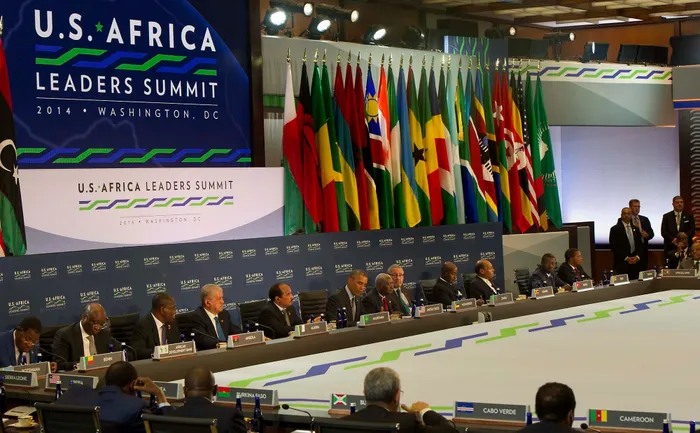Why not everyone is invited to US-Africa indaba

Picture: ANA file – Mali, Burkina Faso, Guinea, and Sudan are the four countries whose leaders have been barred from attending the US-Africa summit in Washington, the writer says.
By Sizo Nkala
Africa is set to engage the US in the upcoming US-Africa Leaders Summit in Washington (13-15 December) but not everyone has been invited to the rendezvous.
Mali, Burkina Faso, Guinea, and Sudan are the four countries whose leaders have been barred from attending the summit. The countries suspended from the December meeting were invited to the first instalment of the Summit in 2014 with the exception of Sudan. Zimbabwe, Central African Republic (CAR) and Eritrea were the other countries banned from attending the first Summit. The reasons cited for the non-invitation include then Zimbabwean President Robert Mugabe being on the US sanctions, suspension of the CAR from the African Union (AU) following a coup d’etat, UN sanctions on Eritrea, and in the case of Sudan, then President Omar al-Bashir had an arrest warrant issued for him by the International Criminal Court (ICC).
Similar reasons have been cited for the non-invitation of the four countries this time around. Mali is under military rule following a coup d’etat led by Colonel Assimi Goïta who has been the interim president since May 2021. Mali was suspended from regional bloc, the Economic Community of West African States (ECOWAS) and sanctions were imposed on the leaders of the coup. Guinea also suffered a coup in September 2021 which ousted President Alpha Conde who was blamed for autocracy and economic mismanagement. He was replaced by Colonel Mamadou Doumbouya who has been the interim president since after suspending the constitution and closing the country. Guinea was suspended from both the ECOWAS and the AU who urged a return to constitutional rule and civilian order.
Burkina Faso underwent a military takeover on September 30, 2022 which led to the ouster of the interim president Paul-Henri Damiba with the coup leader Captain Ibrahim Traore taking his place. The coup leaders pointed to President Damiba’s failure to deal decisively with an Islamist insurgency in the West African state as the reasons for the takeover. Damiba himself had come to power through a military takeover in which he ousted then President Christian Kabore. He then negotiated a deadline for the transition to civilian rule by 2024 with the ECOWAS.
Sudan has been under military rule since October 2021 when Prime Minister Abdallah Hamdok was removed from office in a coup led by General Abdelfattah al-Burhan and Mohamed Hamdan Dagalo. Prime Minister Hamdok returned to office under a power-sharing deal citing the need to stabilise the country’s economy for his co-operation with the coup leaders. The US Secretary of State, Anthony Blinken, said that his country strongly condemned the military takeover and urged the immediate restoration of civilian rule. The US also suspended $700 million worth of aid to Sudan as a result of the coup.
Another curious case is that of Zimbabwe. The Southern African country has been invited in this time after having been barred from the first Summit in 2014 due to sanctions on the country’s leadership.
Since 2001, the Zimbabwean leadership has been under sanctions from the US, based on allegations of human rights and the undermining of democracy. Early this year, Washington renewed its sanctions on Zimbabwe, arguing that the country’s leadership has not done enough to reverse the decline of democracy and respect human rights. This despite sustained calls from the Southern African Development Community (SADC) and the AU for the removal of sanctions.
The sanctions include asset freezes and travel restrictions of persons identified to be instrumental in human rights abuses and undermining democratic processes. Some of the people on the sanctions include key ruling party and government leaders such as Oppah Muchinguri (Defence Minister), ruling party-linked business tycoon Kudakwashe Tagwirei, Zanu-PF stalwart Patrick Chinamasa and former Minister of State Security Owen Ncube among others. The Zimbabwean President Emmerson Mnangagwa is under travel restrictions and can only travel to the US on UN business. Although President Mnangagwa will not be able to travel to Washington, his government has accepted the invitation and will be represented by the Foreign Affairs Minister Frederick Gava. Perhaps this is an indication of the Zimbabwean leader’s desire to re-engage the US and mend the relations between the two countries that have been cold for the last two decades.
The US invitation of Zimbabwe may be a sign that the AU and SADC calls for the removal of sanctions on the country are not falling on deaf ears and of Washington’s openness to a fresh start. Overall, the US cherry picking of the participants in the US-Africa Leaders Summit can be interpreted in many ways. It could be seen as consistent with the new US Strategy Towards Sub-Saharan Africa, one of whose major objectives is to deliver democratic and security dividends. The document states that “The United States will seek to stem the recent tide of authoritarianism and military takeovers by working with allies and partners in the region to respond to democratic backsliding and human rights abuses, including through a targeted mix of positive inducements and punitive measures such as sanctions.” On the other hand, Washington’s selective engagement may be seen as interference in internal political affairs, a tendency detested by African leaders for its paternalistic undertones.
Dr Sizo Nkala is a Research Fellow at the University of Johannesburg’s Centre for Africa-China Studies